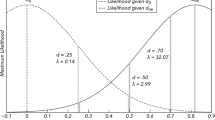Abstract
Scientific testing, including randomly controlled trials, can vary in quality. We describe the Popperian concept of severe testing and delineate ways in which a randomly controlled trial can be weakened and thus made easier to pass. The acceptance and commitment (ACT) publications we have examined appear to instantiate many of these problematic research features. This contributes to the concern regarding overselling of ACT. We call for an explication of these sorts of design features when these occur as well as a minimization of these to decrease the number of false positive results. In addition, we respond to claims of misreading and misinterpretation.
Similar content being viewed by others
References
Abramson, L. Y., Seligman, M. E. P., & Teasdale, J. D. (1978). Learned helplessness in humans: Critique and reformulation. Journal of Abnormal Psychology, 87, 49–74.
Bach, P., & Hayes, S. C. (2002). The use of acceptance and commitment therapy to prevent the rehospitalization of psychotic patients: A randomly controlled trial. Journal of Consulting and Clinical Psychology, 70, 1129–1139.
Corrigan, P. W. (2001). Getting ahead of the data: A threat to some behavior therapies. The Behavior Therapist, 24(9), 189–193.
Coyne, J. (2012, October 22). Mind and the brain. Retrieved from Troubles in Branding of Psychotherapies as “Evidence Supported” http://blogs.plos.org/mindthebrain/2012/10/22/troubles-in-the-branding-of-psychotherapies-as-evidence-supported/.
Gregg, J. A., Callaghan, G. M., Hayes, S. C., & Glenn-Lawson, J. L. (2007). Improving diabetes self-management through acceptance, mindfulness, and values: A randomized controlled trial. Journal of Consulting and Clinical Psychology, 75(2), 336.
Greg, J. A. & Hayes, S. C. (2015). The progression of programmatic research in contextual behavioral science: Response to O’Donohue, Snipes, and Soto. Journal of Contemporary Psychotherapy, 1–9. doi:10.1007/s10879-015-9312-5.
Hooper, N. & Larsson, A. (in press). The research journey of Acceptance and Commitment Therapy (ACT). London: Palgrave Macmillan.
O’Donohue, W. (2013). Clinical psychology and the philosophy of science. New York: Springer.
O’Donohue, W., & Halsey, L. (1997). The substance of the scientist-practitioner relation: Freud, rogers, skinner, and ellis. New Ideas in Psychology, 15, 35–53.
Popper, K. R. (2002). Conjectures and refutations. New York: Routledge.
Roche, B., Forsyth, J. P., & Maher, E. (2007). The impact of demand characteristics on brief acceptance-and control-based interventions for pain tolerance. Cognitive and Behavioral Practice, 14(4), 381–393.
Urbach, P. (1978). The objective promise of a research programme. In G. Radnitzky & G. Andersson (Eds.), Progress and rationality in science (pp. 99–113). Dordrecht: Springer.
Author information
Authors and Affiliations
Corresponding author
Rights and permissions
About this article
Cite this article
O’Donohue, W., Snipes, C. & Soto, C. The Design, Manufacture, and Reporting of Weak and Pseudo-Tests: The Case of ACT. J Contemp Psychother 46, 37–40 (2016). https://doi.org/10.1007/s10879-015-9316-1
Published:
Issue Date:
DOI: https://doi.org/10.1007/s10879-015-9316-1




